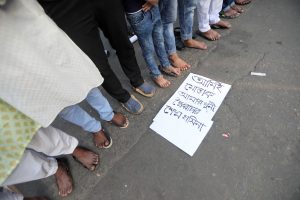The Bangladesh Cabinet has decided to scrap the controversial and heavily criticized Digital Security Act (DSA) of 2018. It will be replaced with the Cyber Security Act (CSA) of 2023. The draft CSA will be placed before Parliament soon.
Speaking about the CSA at a press conference, Law Minister Anisul Huq said that for several offenses, jail terms have been reduced or replaced with fines and several offenses that were non-bailable under the DSA are bailable under the draft CSA. The “misuse” of the DSA “will stop after the enforcement of the proposed law,” he said.
The still-effective DSA has been widely reviled as a draconian law as it provides for stringent punishments. Section 21, for example, stipulates that the publishing of “any kind of propaganda or campaign against [the 1971] liberation war, spirit of liberation war, father of the nation, national anthem or national flag,” will be punished with a jail term of up to 10 years and/or a fine, and to life imprisonment and/or a fine for a repeat offense. Section 28 provides for punishment including jail sentences of up to five years for “publishing information in websites or in any electronic format that hurts the religious values or sentiment.”
The decision to replace the DSA has come at a time when over 7,000 cases filed under this law are pending before the courts. The list of DSA victims is long.
In 2021, writer Mushtaq Ahmed died in jail after being arrested under the DSA for criticizing the government’s handling of the coronavirus pandemic in his Facebook posts. He was denied bail six times.
Cartoonist Ahmed Kabir Kishore was severely tortured after his arrest under this law for his cartoons criticizing the government. He now lives in exile.
In 2020, a 14-year-old boy was arrested under the DSA for criticizing Hasina on Facebook. A first-year university student Khadijatul Kubra was jailed for hosting a YouTube talk show. The guest on the talk show, retired Major Delwar Hossain, who lives in Canada made alleged “incendiary” remarks against the government in that talk show. Police filed two cases under DSA against Khadija and Delwar, alleging that they were “spreading anti-government statements and tarnishing the country’s image.”
Months after Khadija’s arrest in September 2022, the High Court granted her bail but suspended it following an application from the state. Subsequently, the Appellate Division of the Supreme Court too suspended her bail. “If you can call someone for a talk show interview, why can you not take responsibility for what they say?” Chief Justice Hasan Foez Siddique reportedly said while suspending Khadija’s bail. Daily Star reported that Khadija was 17 when she was sued back in 2020.
In March this year, United Nations Human Rights Chief Volker Türk called for an immediate moratorium on the use of DSA, expressing concern that the law is being used to “arrest, harass and intimidate journalists and human rights defenders, and to muzzle critical voices online.” The UN Human Rights Office called for the repeal of Sections 21 and 28 of the DSA and the amendment of eight other sections.
So is the CSA an improvement over its predecessor, the DSA?
In an article in Daily Star, Saad Hammadi, a long-time campaigner for repealing DSA in Bangladesh, pointed out that “most of the problematic penal actions of the DSA are retained in the CSA, while 10 years jail sentence under section 21 of the DSA is reduced to seven years.”
At least six sections of the CSA – Sections 17, 19, 21, 27, 30, and 33 – remain non-bailable. The Forum for Freedom of Expression, Bangladesh, opined that the CSA will not stop criminalizing freedom of expression.
The Hasina government has said that though the DSA will be replaced, cases filed under the DSA will continue and people who are incarcerated will continue to serve punishment.
According to Shamsuzzaman Shams, a reporter for Daily Prothom Alo, both DSA and CSA are against fundamental freedom. “Such acts don’t support basic human dignity for expressing freely,” he told The Diplomat.
Shams was arrested under the DSA from his home for writing a story about the cost-of-living crisis in Bangladesh. His report, which was published on the country’s Independence Day, included a quote from a day laborer who said: “What is this use of freedom if we cannot afford rice.” The government accused Shams of “smearing the image of the government with false news and for raising questions about the achievements of Bangladesh.” He spent time in jail from March 30 to April 3 this year, before being released on bail.
Human rights and freedom of speech advocate Rezaur Rahman Lenin told The Diplomat that the CSA will continue to be used to charge people under vague, overly broad, highly technical, hard-to-investigate, controversial and much-criticized provisions. He said the defamation penalties set in the CSA are too high for the ordinary citizens of Bangladesh. “Unresolved prisoner cases are also troubling. What happens to them? Victims will likely experience more trauma and harassment. DSA cases against them should be dropped immediately and victims should be rehabilitated with human dignity,” he said.
Bangladesh has been ranked 163 of 180 countries in the World Press Freedom Index 2023. The Freedom in the World Report 2023 describes Bangladesh as partly free and states that “the ruling party has consolidated political power through sustained harassment of the opposition and those perceived to be allied with it, as well as of critical media and voices in civil society.”
Will the proposed CSA change the situation?

































